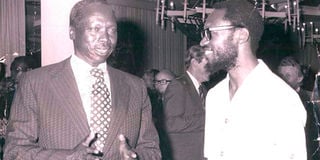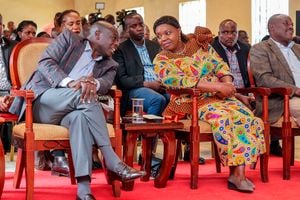Hilary Ng’weno: The most outstanding journalist of our time

Veteran journalist Hilary Ng’weno (right) with former President Daniel Moi. In Hilary’s world, the role of journalism in society was higher than just delivering what the advertisers wanted.
If the greatness of a journalist or publisher is equal to a combination of character and massive intellect; if solid achievement and greatness in journalism is to be measured by the power to make lasting impressions upon people they meet and work with, and to have handled matters whose aftermath is continually affected by what he did, then Mr Hilary Ng’weno was beyond question the most outstanding journalist of our time.
I worked with him for 13 years and was the managing editor when The Weekly Review folded up in July 1999.
My experience of working closely with Hilary for more than a decade taught me the following in the news business – you will come across two types of publishers: Media owners and entrepreneurs.
First, are the men and women who invest in journalism business out of a single-minded pursuit of profits: To pay fat dividends to themselves and fellow shareholders, and to plough back some of the surpluses earned into growing the business.
Secondly, people you can call the philosopher-kings of journalism and publishing. Men and women driven by a sense of mission and whose primary and most important motivation in the news business is to do good to society; to hold people in power to account through fact- based reporting, intelligent comments and analysis. Hilary belonged to the latter group.
Writer’s paper
TheWeekly Review was first and foremost a writer’s paper. In Hilary’s world, the role of journalism in society was higher than just delivering what the advertisers wanted. He was a fervent believer in the purity of newspaper pages and in the sacred wall between the news side of the business and the commercial side.
Which is why in the early stages of the publication, TheWeekly Review would not carry tobacco, alcohol or asbestos advertising.
I was a witness when in the very last days of the paper, Hilary was approached by a prominent Nairobi businessman with tons of cash offering to buy TheWeekly Review title.
At that time, the company was struggling under the weight of crippling loan obligations. Hilary was under immense pressure to raise money to pay severance to employees he was about to retrench.
He needed to sort out large crippling arrears to statutory bodies such as the National Social Security Fund and the National Hospital Insurance Fund.
Journalistic conscience
So, when the Sh10 million offer to buy the title came, I thought Hilary would quickly snap it up. However, he flatly refused to sell the title to the moneyed businessman. And the words he uttered to me in his office at Prudential Building when I asked him why he was not taking such a good offer still ring in my mind. ‘I will only sell to a businessman with a journalistic conscience’.
He continued: ‘Yes, this fellow may have more capital than I have to pump into the business. He is probably a better manager than I.’ Then the clincher: ‘But journalism requires a manager with a journalistic conscience’.
He opted to sell the title to the Nation Media Group at a much lower price. He would say his first preference would have been to sell the title to a journalist rather than a marketer without a journalistic conscience.
In the late 80s and early 90s, the business was making lots of money. This is the period when The Weekly Review started carrying more market-driven content, mainly advertising-rich sections on finance, real estate, automobile and travel.
His Stellascope Group had grown to become a large non-operating holding company that owned and managed a broadcasting division, a large commercial printing operation, multiple periodical magazines and a book publishing company.
It was during these good days that Hilary decided the group needed to be hosted in a one-campus headquarters building that would host all subsidiaries under one roof. That building was constructed along Mombasa Road .Hilary was by this time chairman of a big corporate with diverse interests in the news business.
Around this same period, he accepted a public appointment and became chairman of the Kenya Revenue Authority.
Loyal to his calling
But even after becoming a big man, he did not abandon writing stories, penning commentaries and mentoring young journalists. He remained loyal to his calling as a reporter.
In the journalistic business model Hilary followed, the reader had to be attracted the old-fashioned way – by providing well-reported, trustworthy news along with smart comment and analysis.
As a reporter working under him, he allowed you the latitude to rely on anonymous sources. Indeed, it was The Weekly Review that popularised the phrase ‘observers say’ in Kenya’s newspaper lexicon.
But no reporter would be allowed to hide behind ‘observers’ to purvey leaks from self-serving insiders or as a substitute to old-fashioned news-gathering: First-hand reporting, attribution, relentless interviewing and building and maintaining sources and contacts.
Hilary put a huge premium on journalists who had good sources. If you pick up any past copy of The Weekly Review, the name you will see consistently on the masthead is that of Dishon Shangalla. The chap was not exactly a great writer or worker.
The reason he survived at The Weekly Review was that Hilary appreciated his skills in building networks and in gathering ‘muchene’, especially within the intelligence, police and defence departments.
I owe anything I know in journalism to this man. ‘Journalism is primarily about delivering surprise to the reader, he once wrote to me in a memo as we went through a post-mortem of the first issue of the Financial Review.
‘If you want to analyse economic policy competently, you must be prepared to read widely, break more news, write harder and be more questioning,’ he continued as he handed me bound volumes of past issues of the Economist and the Wallstreet Journal.
In those days, business journalism was mostly about channelling press releases from public relations firms. The rare interview with a CEO would be an exercise in fawning sycophancy.
Hilary cast a spell on the journalists so much so that some reporters and editors found themselves trying to keep a similar beard like his even as others tried to copy the way he dressed – his trade mark polo neck top worn under a tweed jacket with patches at the elbow.
He was a fervent believer in the traditional priorities of journalistic publishing – the reader first, employees second and the shareholders of the company last. He had an eye for the scarcest resource in journalism – talent – and would bring the best to his team. There was a time we were the only reporters in town carrying ‘Diner’s credit cards. He took care of his employees.





